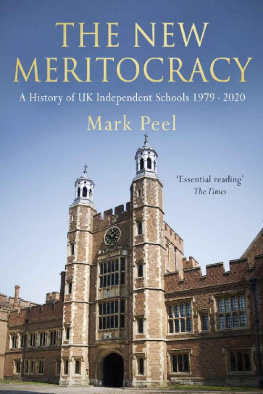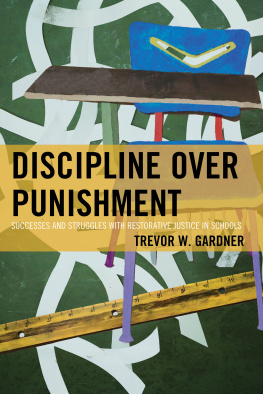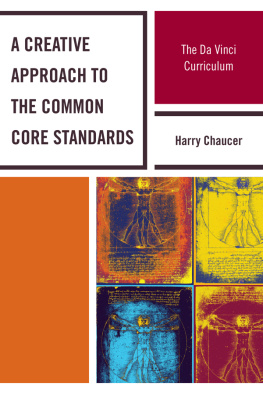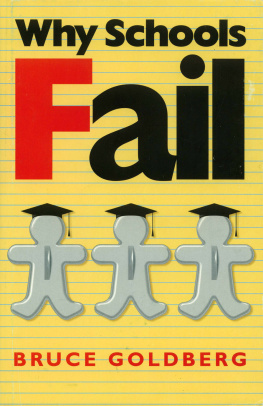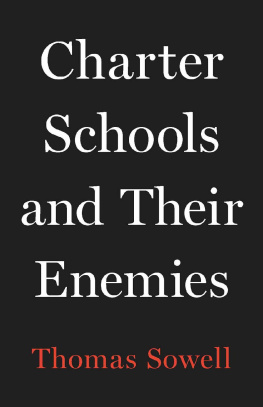THE NEW
MERITOCRACY
A History of UK
Independent Schools
19792
Mark Peel
First published by Flliott and Thompson Limited in 2015
Copyright Mark Peel 2015
This edition published in 2021 by Lume Books
30 Great Guildford Street,
Borough, SE1 0HS
The right of Mark Peel to be identified as the author of this work has been asserted by them in accordance with the Copyright, Design and Patents Act, 1988.
All rights reserved. No part of this publication may be reproduced, stored in a retrieval system, or transmitted in photocopying, recording or otherwise, without the prior permission of the copyright owner.
Table of Contents
INTRODUCTION
In January 2011 the political broadcaster Andrew Neil attracted much comment with his television programme Posh and Posher: Why Public School Boys Run Britain , examining the rebirth of the English political elite.
Neil, a grammar-school boy made good from Paisley in the west of Scotland, argued that, following a period of meritocracy between 1964 and 1997 when every single prime minister was grammar-school educated, the election of the Old Etonian David Cameron in 2010 and his cabinet of millionaires symbolised the return of a narrow political elite. According to Neil, the primary reason for the decline of social mobility was the demise of the grammar schools:
Thirty years on from the end of the grammars, its no coincidence that public school boys have triumphed. Without the grammars, theres simply less competition. And that means politics is missing out on a lot of potential.
While Neils thesis has a certain validity, it should also be noted that the concept of meritocracy didnt simply disappear it found a new home in the resurgent independent sector. With nearly half of their intake now comprising first-generation pupils, these schools responded to more competitive times by turning themselves into meritocratic powerhouses, offering a much broader education than they had previously.
Although these schools had educated the social and political elite over the centuries, their eminence rested on narrow foundations. In common with so many institutions they had failed to keep pace with the challenges of a rapidly changing world, so that while the academic and sporting elite were well catered for, the majority were ill-served by the narrow curriculum and a conformist culture that stifled individual flair. The journalist and author Charles Moore recalled:
When I was at Eton in the 1970s, a very large proportion of the boys came from landed families. Many were not, to put it mildly, ambitious. Some read only the Sporting Life , and that with difficulty. Today, their numbers at Eton have dwindled dramatically.
Confronted with the election of a Labour government in 1964 committed to the end of selective education, the independent sector found itself on the defensive for much of the next two decades. Yet, when the axe duly came, it fell on the direct grant schools high-achieving day schools funded partly by central government and grammar schools, which, paradoxically, strengthened the independent sector, since the majority of the former opted to go private (see Chapter 1).
With the introduction of the assisted places scheme tax-funded places at private schools by the Thatcher government in 1980, and the onset of a low-tax economy that boosted the income of the middle classes, the independent sector flourished. Even the return of Labour in 1997 did little to stir the waters as the Blair government sought partnership not confrontation with its former adversary, not least in its attempt to raise national educational standards.
A more serious challenge arose in the form of market forces (discussed in Chapter 2). The 1980s saw schools expand their facilities, refurbish their boarding accommodation and increase salaries, all of which caused fees to soar following their exorbitant rise in the 1970s. With boarding in decline, a number of schools in remote or less affluent areas were forced to close. Others survived by taking girls (see Chapters 12 and 13), recruiting overseas and raising significant sums from their alumni. For those schools in more prosperous parts and offering a first-rate education, the runes were more favourable. Governing boards became more professional, financial management more efficient and the business expanded, all of which laid the foundations for progress in all walks of school life.
At the heart of the Thatcher revolution lay the principles of competition and choice. Parents now play a central role in their childrens education (see Chapter 3); from being fringe participants, they became ever present and have used their consumer power to good effect by demanding the very best. These expectations have added to the workload of many a head and their staff, but despite the tension caused, accountability to parents has undoubtedly forced schools to raise their standards.
Confronted with parental concerns, as well as those expressed by governors, alumni and inspectors, heads are no longer the powerful autocrats of old. Those who fall short are more vulnerable to dismissal or premature retirement than hitherto, as witness the demise of a number of leading heads in the 1990s (described in Chapter 4). At the same time, those heads with a clear vision, forceful personality and a supportive board of governors can still make a difference, as evident in the fortunes of Radley under Dennis Silk, Eton under Sir Eric Anderson and Wellington under Sir Anthony Seldon.
Essential to the fortunes of any modern school is its record of scholastic achievement, a far cry from the 1970s when the independent sector under-performed in comparison to the grammar schools. Consigned to bleak, draughty classrooms and saddled with many an uninspiring teacher, the will to learn often took second place to playing for the rugby XV or becoming a school prefect. Academic indolence was certainly frowned upon but poor exam results were viewed more as a matter of private grief than public mourning. Better for Harrow to beat Eton at Lords than win a cluster of scholarships to Balliol.
Although consumer power brought an improvement in the 1980s, it needed the establishment of external inspection and league tables in the 1990s to galvanise schools into action (see Chapters 6 and 7). Heads may have raged against league tables and their inability to discern all-round excellence, but a leap up these tables or a triumph over their chief rivals would be a cause for public celebration, in the same way that a slump in fortune would result in recriminations behind closed doors. While the quality of independent school teachers does continue to vary, the lazy and incompetent are now very much the exception rather than the rule. At the same time, their successors are better trained, more versatile in their teaching methodology and more willing to work with their colleagues for the common good.
Raised in a more egalitarian age, better acquainted with the pupils through extra-curricular activities and more sensitive to their concerns, teachers have stepped down from their pedestals to form more fruitful relationships. Confrontation has given way to collaboration and criticism to encouragement, so that lessons have become a more rewarding experience (see Chapters 6 and 7). While exam pressures have somewhat stifled independent thought, teachers, in contrast to their colleagues in the state sector who are constrained by the prescriptive criteria of government inspectors, still have the opportunity to teach in their own distinctive manner.
With its new-found commitment to academic excellence the independent sector continues to dominate entry to Oxford, Cambridge and other elite universities (see Chapter 8). Under political pressure to widen access to universities following the Laura Spence controversy of 2000 when Gordon Brown, Chancellor of the Exchequer, berated Magdalen College, Oxford, for rejecting a top-flight state-educated candidate, admissions tutors have made every effort to comply without lowering their standards. Believing their charges to be the resultant victims of discrimination, independent heads cried foul. However, any threat to their hegemony only made these schools more determined to pass muster, and so far they have succeeded.
Next page
